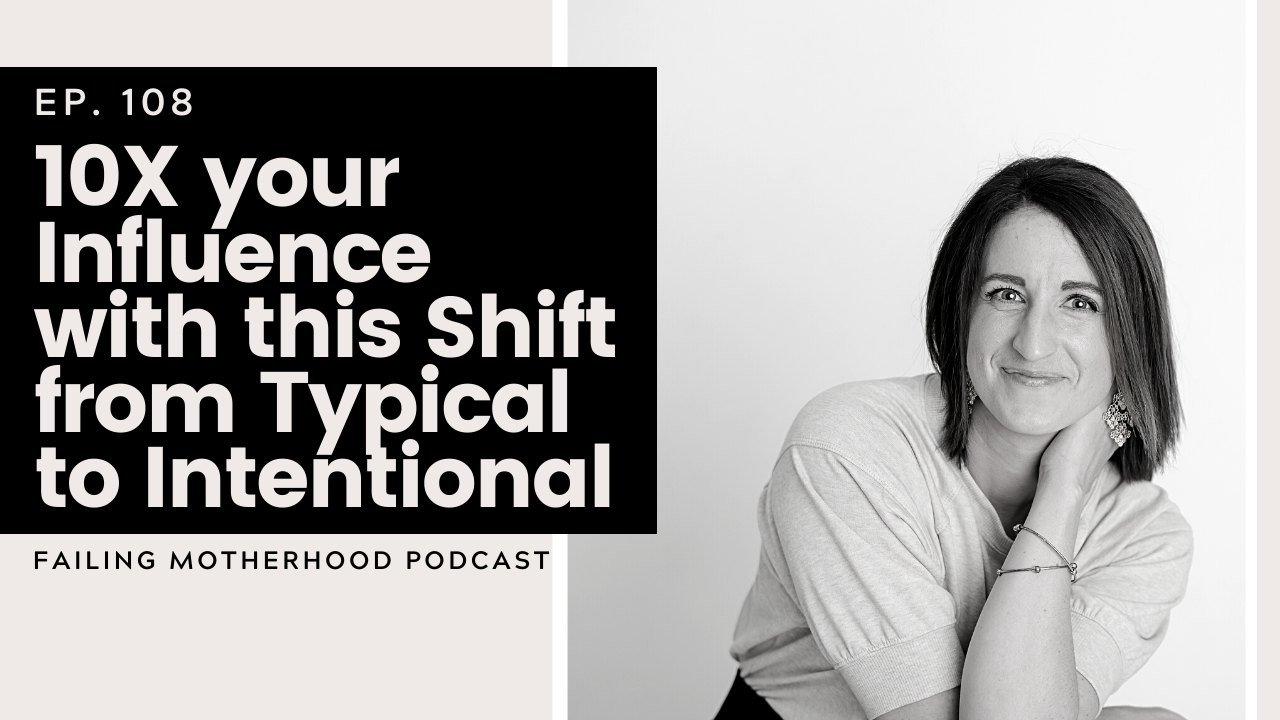How do I step back + rethink my parenting entirely?
May 31, 2023
4 Steps. 1 Takeaway Message.
Rewrite them + multiply the effectiveness of your parenting tenfold!
IN THIS EPISODE, I SHARE...
- How to flip your parenting from "typical" to "intentional"
- Insight into the message your child's receiving from you
- How to zoom out and make sense of shifting your approach entirely
DON'T MISS:
- A new way of looking at the parenting you experienced as a child
Break down the shift FROM:
- Reaction
- Direction
- Explanation
- Manipulation
TO:
- Explanation
- Validation
- Collaboration
- Empowerment
// CONNECT WITH DANIELLE //
IG: @parent_wholeheartedly
APPLY: parentingwholeheartedly.com/apply
FREE CONSULT: wholeheartedly.as.me/call
*FREE* MASTERCLASS: Learn how to CONFIDENTLY parent your strong-willed child WITHOUT threats, bribes or giving in altogether so you can BREAK FREE of power struggles + guilt
www.parentingwholeheartedly.com/unapologetic
TRANSCRIPT
Danielle Bettmann 0:05
Ever feel like you suck at this job? Motherhood I mean? Have too much anxiety, not enough patience. Too much yelling, not enough play. There's no manual, no village, no guarantees. The stakes are high. We want so badly to get it right. This is survival mode. We're just trying to make it to bedtime. So if you're full of mom guilt, your temper scares you. You feel like you're screwing everything up, and you're afraid to admit any of those things out loud. This podcast is for you. This is failing motherhood. I'm Danielle Bettmann. And each week we'll chat with a mom ready to be real. Sharing her insecurities, her fears, your failures and her wins. We do not have it all figured out. That's not the goal. The goal is to remind you, you are the mom your kids need. They need what you have. You are good enough. And you're not alone. I hope you pop in earbuds somehow sneak away and get ready to hear some hope from the trenches. You belong here, friend. We're so glad you're here.
Hey, it's Danielle. Welcome back to Failing Motherhood. Today's episode is coming out one day late this week after Memorial Day because number one, it feels like a Monday even though it's a Tuesday. And number three. But what am I even, I'm not even counting what is happening. My brain feels like I'm coming back from like a long vacation even though it's just been a long weekend. But it was a really, really full weekend with our family like school got out last Thursday, we went summer clothing shopping with the girls, we had our first family bike ride our youngest finally learned how to ride her bike. And my husband actually got his own bike. And so we could finally do that. And we did some pressure washing of our deck. That was an undertaking. super rewarding though it looks great. And he did some grilling. And we just got to like, get a bunch of little projects done that just feels so good. And the weather is gorgeous. And I just love this time of year feels like a breath of fresh air literally and figuratively. So I hope you are feeling that fresh start yourself I hope that you are moving into easier days maybe less asked of you and more that is of your choice, adding into your schedule.
And I'm just really excited because Wholeheartedly CALM right now. I'm just gonna be honest, I don't like I don't need to give you the whole rigmarole of how amazing it is. But the group I have right now is genuinely so good, like, so fun to work with. They are. So like self-directed self-starters, they are taking things on asking so many questions supporting each other, supporting their partner. Oh, it has been so good. They've been asking fantastic questions, which I've been writing down to be able to share with you here on the podcast as well. So look for that, in the coming weeks. Just little things like what to do when your kids say this is unfair, and what to do about apologies, and just lots of lots of little things.
But today, what I want to talk about is something bigger. And I feel like when especially if you are into researching parenting and what follow a lot of Instagram accounts, you're going to see a lot of content that is getting going to get you lost in the minutia of the day to day, you just get lost in the tiny little, you know, don't say this, but say this type of shifts, and they're just giving you so many reasons to feel like you are failing and forgetting. And as much as you want to know the what and the how, if you don't understand the why. And you don't know how it fits into this bigger picture or umbrella, it's still going to be really hard especially if you are pushed to the brink with it is not working or you get any type of resistance or pushback from your partner or from other caregivers in your life. You're not going to know how to explain it or defend it and so it's just gonna crumble and it's gonna crumble with time it's gonna crumble with consistency, and you're not gonna be able to stick to it at all. And yes, some of those, you know, don't say this, but say this shifts are very important and the semantics of our words are very powerful and there are a lot of very digestible tiny little tips and tricks that a chi Enjoy life, I totally recommend it and guarantee it.
And what I want to be able to do on today's episode is help you zoom out, see the big picture of parenting and a little bit of a new light, and help you understand one of the biggest shifts you can make in your parenting as a whole. And this applies to all parents, not just parents or strong-willed kids. And this shift alone could like 10x your influence and effectiveness. As a parent, if you truly are able to implement this, it helps you to shift your approach entirely, not just from one step forward, or trying to align with like a certain brand of parenting. This is just one thing you can do to look at it differently and see everything in a new light.
So what I'm going to dive into is the before and after the before of kind of what your default might be what your instincts might be that you were given of how to parent, and kind of like the three or four-step process that you subconsciously or unconsciously, might be in and using right now. And the kind of the the mantra or the understanding of what that is all about what the big picture kind of takeaway is. And then we're going to dive into the after the, what we want to shift towards what it could be as an alternative, or as a substitute, and what the three or four step process would be instead. And what that main takeaway is, that kind of sums it up.
And so we're gonna, I'm going to paint one picture, and then I'm gonna paint the other picture, and then we're gonna be able to put them side by side. And being able to kind of do the contrast and compare is what really makes this effective, because I could throw out just the after. And you're like, Oh, that's nice and lovely. But I don't see how that either applies to me, or what I need to actually question or subtract from my own parenting and where the subs in. So that's what I'm going to help you understand right now.
Okay, so let's dive into the before. What is the default, the instinct, the overall generalized idea that we may or may not have even realized we were given? Okay? So parenting tends to be a lot of do this. And don't do this. In the moment, you may or may not have heard me talk about this before. But the moment of the most influence is not right in the middle of intervening for a behavior. It is all the moments before and after. But the thought that we're given is that that moment, but through behaviorism, is the most important and you either you know what you do in that moment, decides whether or not that behavior is going to continue.
So it's a lot of do this, don't do this in the moment. And in the moment, step one usually going to react, right, usually not a whole lot of intentionality, or mindfulness that comes out through that reaction, because it is really visceral. And it is, at most times, activating some sort of trigger within us that creates a fight or flight response, and we're feeling attacked, or we're feeling in, in danger or embarrassed or shamed or, or worried or fear. And so that reaction comes up first, then we shift to a direction, right that don't do that, or do this. And we're trying to communicate what needs to change now, then we usually follow that up with an explanation. Right? It's,
Danielle Bettmann 9:15
I know a lot of parents that are working to parent differently than they were parented are trying to use a lot of logic and reasoning, to be able to help their kids understand the why out of great intentions, right? Because they're not trying to create this power over dynamic. Do it because I said so. And so they're trying to explain why. Right? You can't hit your sister. We don't do that in our family. Those types of explanation or logic of you can't go outside because it's raining, you know, like yada yada yada. So we have a reaction, we have a direction you have an explanation. And then the optional fourth step which is leading into To the road, we don't want to take but my end up taking a lot of the times, which is some sort of coercing, manipulating or debating to try to get them to change their behavior. We don't love it. But sometimes it just feels necessary. Right?
So that four step process, again, is a reaction, a direction, an explanation. And then all of the fun coercing that follows or manipulating or negotiating or just trying to get them to do what we need them to do, right to get their cooperation. And so what that takeaway is, of that kind of four-step default process of parenting is the takeaway, or maybe the message that your child is receiving is, you understand me, that's what you're saying to your child? Understand me. Okay, so all of that, do this, don't do this reacting and then explaining and then Cory, saying, you're coming from a place of the message received is, you need to understand me. Okay. So that's me painting the picture of the before, right? That you may or may not have consciously subscribed to, but for the most part is there that may be how you were parented that might be just some of the press and this might not, you know, the words might not be perfect to describe your experience. Okay. But I'm just trying to create a comparison. So if that's the before, what is the alternative? How would you possibly look at that paradigm? Any differently?
Okay, so now we're going to look into a different four steps and a different takeaway message. The first shift is that change from believing the moment of most influence is when, right after a behavior occurs, it's simply not true, because your child is not in a teachable state, and you are not in a teacher mentality. No one is learning a lesson in that moment, it is survival mode, it is a moment to respond to emotion, not logic, and it does not create the dynamic of what will happen again next time because humans are nuanced creatures. They are not lab rats. Okay, our kids are not just responding to a Pavlov type experiment. They are actually very deep creatures and beings that have motives way beyond the external, what do I get? Okay.
So that's one big shift. But what would be the four steps, then that would we would do instead, number one, explaining before a behavior occurs. Okay, that's the biggest paradigm jumps so far, explaining, we're not step one reacting.
Step one is instead explaining expectations and agenda, before a behavior ever has the chance to occur. This is using the moment of in that has more influence, which is the neutral times before and after a way before and way after a behavior occurs. And it's tapping into when your child is most teachable. And you're creating a runway and a heads up so that you're aligning expectations ahead of time, which is huge for allowing your child to have a felt sense of control and predictability in their daily life. So step one is explaining way before the behavior could occur.
Then step two would be validate in the moment of an emotional reaction or when a behavior is occurring, you are not agreeing with them, you are still holding boundaries, but you are validating what their lived experiences in that moment, the message that they're trying to send, if their behavior is communication, you are saying, I hear you, okay? And it's understandable, maybe that you would feel that way given what I know about you this behavior or response, makes sense that you would have a hard time with this. That's validation. Just a very, very, very unlearned and underrated skill most adults do not understand or master, right. So if you don't know how to do this, well, you are in the major majority. There is no reason why you should be Do you have at this point
number three, so for explaining way before then validating, then we're problem-solving. So with my clients and positive discipline, I teach a collaborative problem-solving approach. That means that you see everything as a problem to solve with your child that you're on their team. And you're helping them identify and work with. and problem-solve a certain circumstance, a limiting factor, a rule that can't be broken a situation that has come up, that they have to be able to acknowledge, and then work around. This is a life skill that we need to model and teach. And we can do that in 10s and 10s. Of moments throughout the day, where then we're gonna problem solve with them. Rather than creating me versus you, it's us against the problem.
And then step four, is empowered, going to empower your child with next steps with dignity that allows them to engage in solving the problem and have dignity in the way that they move forward. That helps them regain a shared sense of understanding and control and allows them to work their way back, to make amends to move forward in a way that is not leaving them feeling disempowered and discouraged, and feeds the vicious cycle of where that behavior might have been coming from in the first place. And instead, allows them to see that, that their actions do have consequences. And they have choice in their actions that create different results. And there are other avenues that they can take that feel really good. And that makes it more likely that they'll choose those next time. So that next time actually does go differently and better than this time, as opposed to repeating the groundhog day tomorrow.
So the main takeaway message that your child receives from this approach from you, is rather than a one that says, hey, you understand me? Instead, in this approach, you're saying, I understand you? Do you see how powerful that shift is? From understand me, too, I understand you. So let's look at them again. To compare and contrast. The before is a reaction, a direction, an explanation, and manipulation. Right. And the message is, you understand me? Versus the second approach could be an explanation, validation, problem solving, and empowering. And the takeaway message being I understand, you know, how do you actually do that? That's what I teach. That is the kind and firm approach, that whole idea of walking the line between validation and high expectations, a warm responsiveness and firm boundaries. And if that hasn't been modeled for you, if you haven't been under a mentorship where this was done really well, how can you know how to do that?
Danielle Bettmann 18:54
Okay, how can you right, this is something I had to learn, my husband had to learn all the clients that hundreds of families that I've worked with, up until this point, have learned for the first time and when they do it unlocks everything. re out whole new understanding of their role as a parent, entirely different toolkit of strategies, a transformed relationship with their child and kids and partner and work colleagues and friends. They use it on each other, they improve their marriage. This is a huge life skill that I'm probably underplaying by just saying that it works in your relationship of parenting your strong-willed child, but that is where I have seen a huge, huge, huge amount of transformation and change in the families I've worked with and that is what I am here on this earth to help families do.
So. If and when you add Your family are ready to implement this, to actually learn how to do it, to be able to know how to in every circumstance and have the nuanced tweaking and troubleshooting and problem-solving, of seeing what you cannot see for yourself all the blind spots that are keeping you stuck that are sabotaging you, that feel like you're trying to do this, but it does not feel like it's working. The outcomes are not there, or the other things you've tried are just not there. Feels like you've tried everything, but nothing is working. But if you are ready to have the support, you deserve to truly take this on and individualize it for your family, not only for today and tomorrow, but for 10 years down the road, then it's time to have a conversation, right? A lot of families do this work over the summer so that they are entirely different place when school starts.
Because nothing feels better than knowing you've done everything you can do as a parent to set your child up for the success that they need to have, and the environments that are expecting even more out of them. And when your child spends more time at school, that means that their time home with you is even more condensed and concentrated. Which means if they're struggling now the behaviors they're going to experience then are even more potent. And that is difficult for both of you. You don't want to spend your short afternoons and weeknights, struggling, both having a really really hard time when all you need is is time with each other truly want to be able to have the freedom to live your life more on your terms and have more fun as a family. That is so possible by shifting this approach. And it's more than a tips and tricks. It is a paradigm shift it is looking at everything you're doing and changing it entirely. Which takes time. You can't do this, Rome was not built on one day, which is why we work together for three months, there is no way you can expect anything different out of yourself, okay?
So if you are ready to change the way that you parent entirely and do it with your partner or without your partner either way, totally feasible. You deserve support, especially if your partner is not on board. But let's just have a conversation, and schedule your consultation, and I will never ever, ever make you feel like you are obligated or pressured to work together. That is where we need to figure out if we're a perfect fit. And if we are a perfect fit, then we'll talk through all the details of how to make the timing and the payment plans and all that good stuff work for you. Okay, so I am so excited to be able to have a conversation to meet you. I'm so honored that you are a part of this podcast and you are tuning in and you are following and your child is so lucky to have you seeking out these resources and working to do better one day at a time. I am here to support you friend and schedule your consultation at using the link in the show notes. It is wholeheartedly.as.me/call
I believe in you. And I'm cheering you on.
Danielle Bettmann 23:34
Thank you so much for tuning into this episode of Failing Motherhood. Your kids are so lucky to have you. If you loved this episode, take a screenshot right now and share it in your Instagram stories and tag me. If you're loving the podcast, be sure that you've subscribed and leave a review so we can help more moms know they are not alone if they feel like they're failing motherhood on a daily basis. And if you're ready to transform your relationship with your strong-willed child and invest in the support you need to make it happen. Schedule your free consultation using the link in the show notes. I can't wait to meet you. Thanks for coming on this journey with me. I believe in you, and I'm cheering you on.



